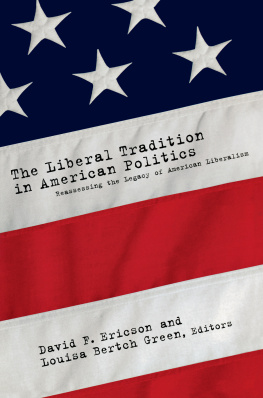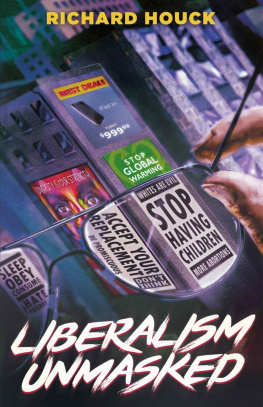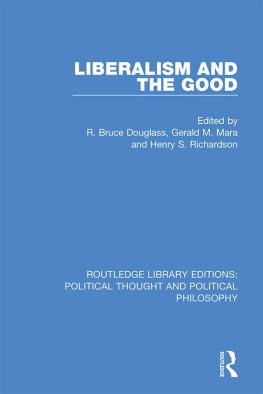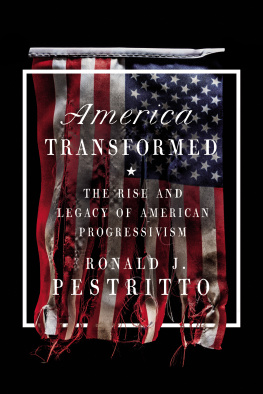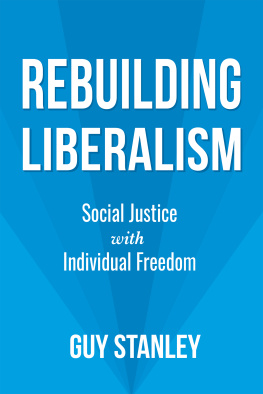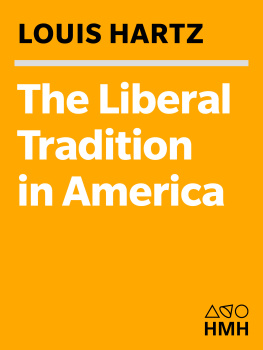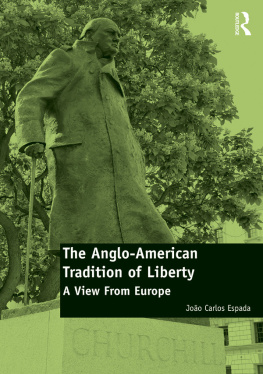First published 1999 by
Routledge
Published 2013 by Routledge
2 Park Square, Milton Park, Abingdon, Oxon OX14 4RN
711 Third Avenue, New York, NY, 10017, USA
Routledge is an imprint of the Taylor & Francis Group, an informa business
Copyright 1999 by Routledge
All rights reserved. No part of this book may be reprinted or reproduced or utilized in any form or by any electronic, mechanical, or other means, now known or hereafter invented, including photocopying and recording or in any information storage or retrieval system, without permission in writing from the publishers.
Cataloging information is available from the Library of Congress.
ISBN 13: 978-0-415-92256-2 (hbk)
ISBN 13: 978-0-415-92257-9 (pbk)
The papers in this volume were prepared for a conference on the liberal tradition in American politics, at the University of Chicago, 23 November 1996. At the suggestion of Benjamin Frankel, the conference was held in memory of J. David Greenstone (19371990), who was William M. Benton Distinguished Service Professor in Political Science and the College at the University of Chicago.
The editors would like to express their appreciation to the Division of the Social Sciences and the Department of Political Science at the University of Chicago and to Norman Nie, Professor of Political Science, for their support of the conference. The editors would also like to express their appreciation to the following individuals: Kathy Anderson, John Diggins, Ben Frankel, John Mark Hansen, Charles Lipson, the family of J. David and Joan Greenstone, the participants in the conference whose papers appear in this volume, and Paul Peterson, who chaired the conference.
David F. Ericson
Louisa Bertch Green
In 1955, when Louis Hartz published The Liberal Tradition in America, he argued that American political development was best understood as the unfolding of a single liberal tradition of ideas.
Over the last forty years, Hartzs thesis has not gone unchallenged. Indeed, some scholars have argued that another paradigm shift in our understanding of American political development occurred in the 1970s when republican revisionists Bernard Bailyn, Gordon Wood, and J. G. A. Pocock argued that American political development, at least for a time, was best understood as the unfolding of a republican rather than a liberal tradition of ideas. The crux of the difference between republicanism and liberalism, as understood by these historians, was the difference between a politics of virtue and a politics of interests.
In the 1980s J. David Greenstone attempted to bolster Hartzs original thesis against such attacks while at the same time subjecting it to his own deep criticism. Relying on a more nuanced analysis of political language(s), Greenstone argued that American political development was best understood in terms of a dialectic between two types of liberalism. In his final formulation, Greenstone called these two types of liberalism humanist and reform liberalism, the former emphasizing the individual pursuit of interests and the latter the development of individual human faculties.
More recently, both political scientists and historians have favored a more philosophically synthetic approach, arguing that American political development is best understood not as one tradition of ideas but as multiple traditions of ideas. James Kloppenbergs article The Virtues of Liberalism: Christianity, Republicanism, and Ethics in Early American
The present volume on the liberal tradition in American politics is a contribution to this growing, cross-disciplinary field of research. First, the volume extends the field into new areas of research: African-American thought, proslavery thought, contestations over citizenship during Reconstruction and in the Progressive era, and the cultural dimensions of Supreme Court decision making. Second, it explores the microfoundations of American political development by analyzing the conceptions of rationality and of what is public that are implicit in American political development. Third, it shifts the emphasis in research at least partially from the development of political ideas to the development of political institutions. Fourth and finally, the essays together ask a hitherto unasked question: What does it mean to view American political development through the prism of one or more traditions of ideas and how does that approach advance or, alternatively, impede research? In these ways, we believe the volume accomplishes much of the conceptual work now needed to maintain the field of politics and history on a forward course.
THE ESSAYS
Rogers Smith,Liberalism and Racism: The Problem of Analyzing Traditions
In this essay, Smith begins with the observation that isms and traditions are always the human constructions of either primary actors and/or later interpreters based on evidence of past human words, documents, and deeds. The validity of the constructions varies with the quality of the evidence and its interpretation. The range of such constructions, he notes, is between an explicit tradition, in which participation is self-conscious, and an implicit tradition, which is the construction of scholars looking backward. He cites Hartzs liberal tradition as a scholarly construction in apparent contradiction to racism, which, though it is not ordinarily treated as an American intellectual and political ideology or tradition, lies somewhere between the implicit and the explicit. Concluding that the scholarly construction of liberalism may yet prove the most useful, he nevertheless calls for its rigorous testing as the dominant explanation in American politics.
Karen Orren and Stephen Skowronek, In Search of Political Development
This paper integrates existing approaches to American political development into a common framework, arguing that the focus on liberalism has obscured the task of defining other relevant core concepts such as development itself. Orren and Skowronek survey political, cultural, regime theory, and historical-institutional approaches to American politics before defining development as the dismantlement or durable displacement of one set of governing arrangements by another set of governing arrangements. They stipulate two phases for development: the wresting of authority from established institutions and the rearrangement of authority among institutions relative to one another. Without both, a change is too fragile to count as development. In this way, Orren and Skowronek seek to explain political development without the necessity of assuming that it is either teleological in nature or guided by a consensual liberal tradition.
Louisa Bertch Green, The Liberal Tradition in American Politics: A Slow Boat to Democracy
This essay focuses on parallel observations of her own and other scholars to point out the connections between the slow pace of democratization in the United States (and elsewhere), on one hand, and, on the other, a longstanding absence in the literature of American politics of an analytic concept for what counts as public. Arguing that the historical liberal emphasis on individual rights and property has pragmatically, but not in principle, overshadowed our vaguer ideas of what is public, Green sets aside the question of whether a policy or interest

